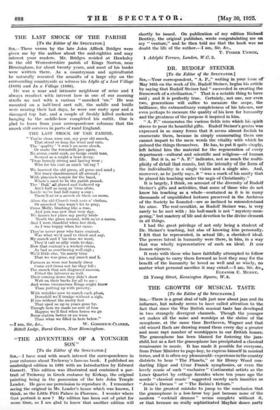THE LAST SMOCK OF THE PARISH
[To the Editor of the SPECTATOR.] SIR,—These verses by the late John Affieck Bridges were given me by the author about the mid-eighties and may interest your readers. Mr. Bridges resided at Hawksley in the old Worcestershire parish of Kings Norton, near Birmingham, for about twenty years, and most of his books were written there. As a countryman and agriculturist he naturally resented the assaults of a large city on the surrounding countryside as witness his Idylls of a Lost Village (1889) and In a Village (1898).
He was a near and intimate neighbour of mine and I always recollect with interest how in one of our morning strolls we met with a curious " smocked 'un." He was mounted on a half-bred cart colt, the saddle and bridle were nearing their last days, he wore one rusty spur and a damaged top hat, and a couple of freshly killed cockerels hanging to the saddle-bow completed his outfit. One is glad to learn from your correspondence columns that the smock still survives in parts of rural England.
THE LAST SMOCK OF THE PARISH.
" You're clean wore out, my poor old smock, That stood so long the wind and rain.
The quality' t won't no more shock, Or make the townsfolk jeer again.
No storm could soak, no hedge could tear, Seemed as a might a beat decay.
'Twas homely strong and lasting wear ; Who for his coat as much 'ud say ?
We knowed the old green, all gorse and sand ;
Not rosey-dandrummed all around ; With gimcrack temple for the band, Where's used to be the parish pound.
The Bull' all glazed and tinkered up Ain't half as snug as 'twas afore, Inside we've had full many a sup ; There'll ne'er a smock sit there no morn.
Afore the old Church took note o' clothes, Or smocked 'uns wasn't let to pray, Come Molly, blushing like a rose, And you was new that very day.
We knows her place my pretty bride
'Neath the green mound, with ne'er a name,
And I were thankful when her died,
As I was happy when her came.
They're never poor who have content, Was what we'd used to think and say. My smock and I 'tis time we went, They'd call us silly vools to-day. Now that content's a wicked crime, As bad as murthering well-nigh ; We'd little else, 'tis surely time That we was gone, my smock and I: Farmers as wore our homely dress Come evil times not far they fell ; The smock that not disgraced success, Fitted the labourer as well.
Their coming down they didn't show Writ on their backs for all to see ; And worse companions Kings might know Than putting up with poverty.
With wrinkles now to match each pleat, Downhill we'll trudge without a sigh, If too without the merry feet That sped us up in years gone by. Though here we made no sort of fuss Happen we'll find when hence we go Some station better or no wuss Than what we filled in here below."
Bitten Lodge, Band Green, Near Birmingham.










































 Previous page
Previous page